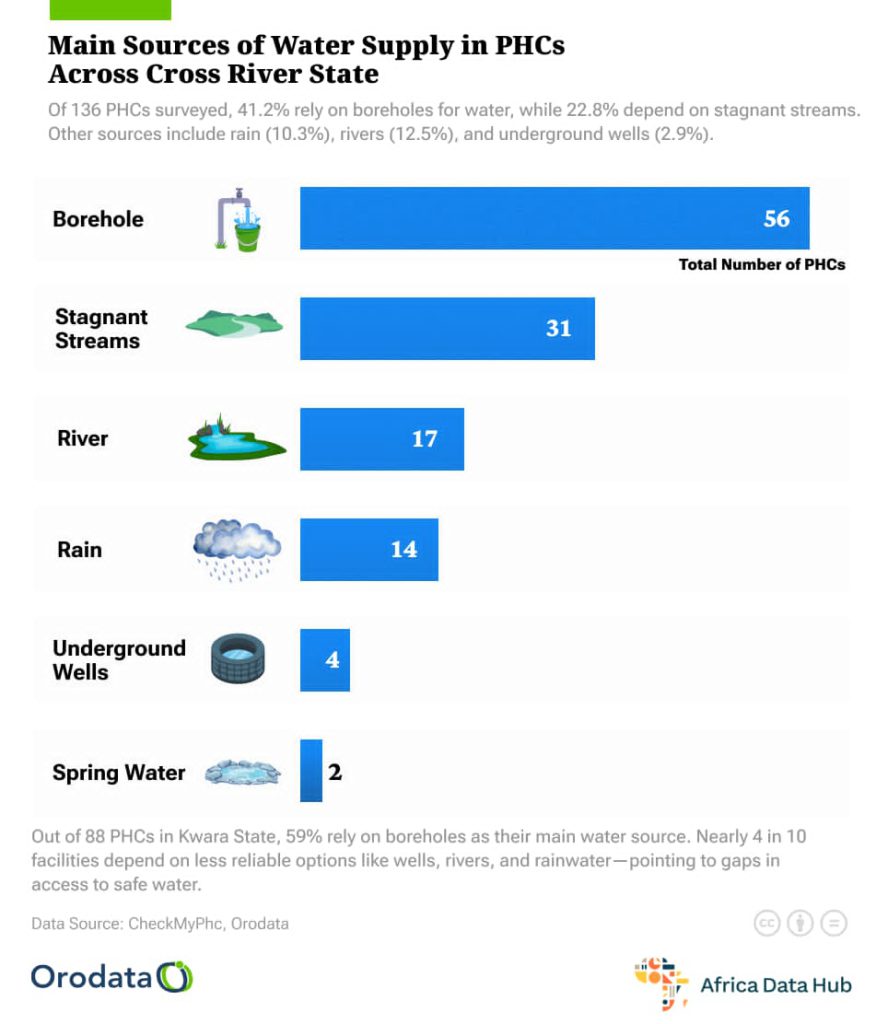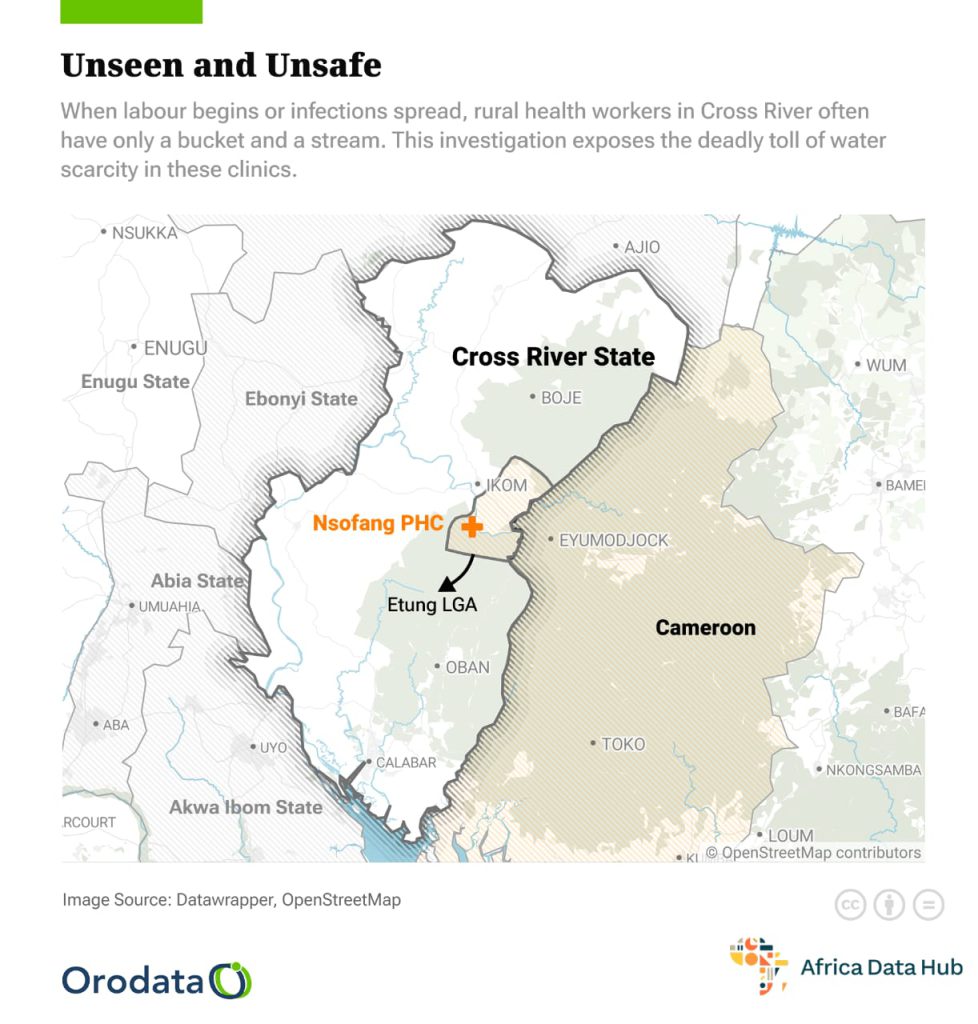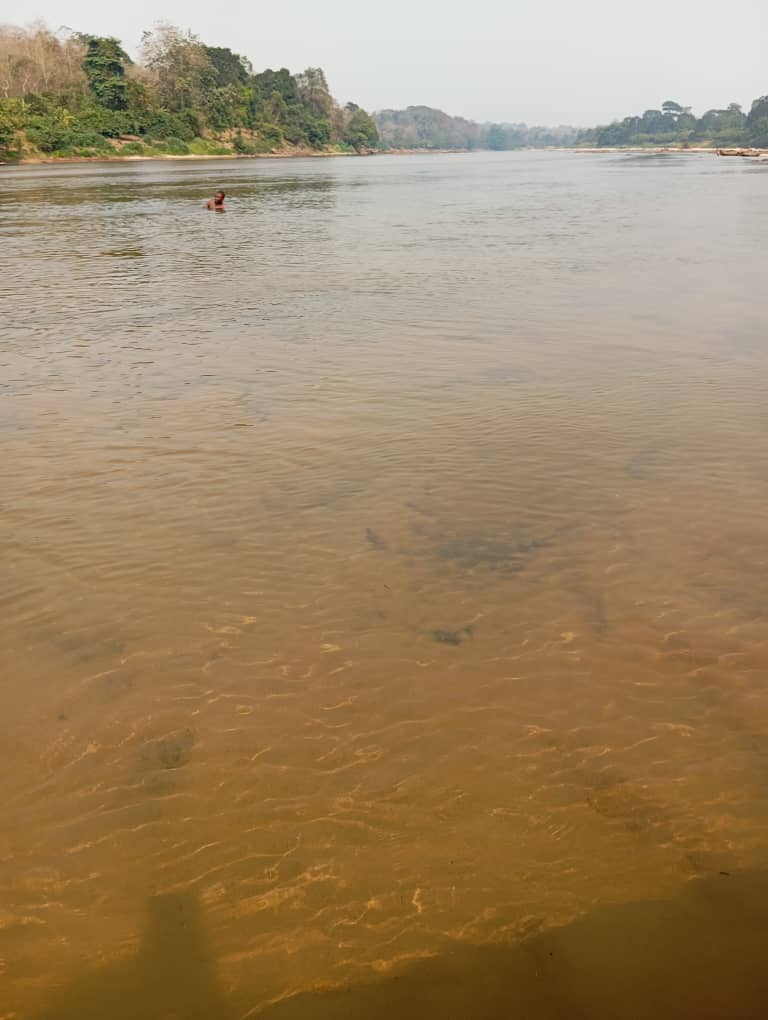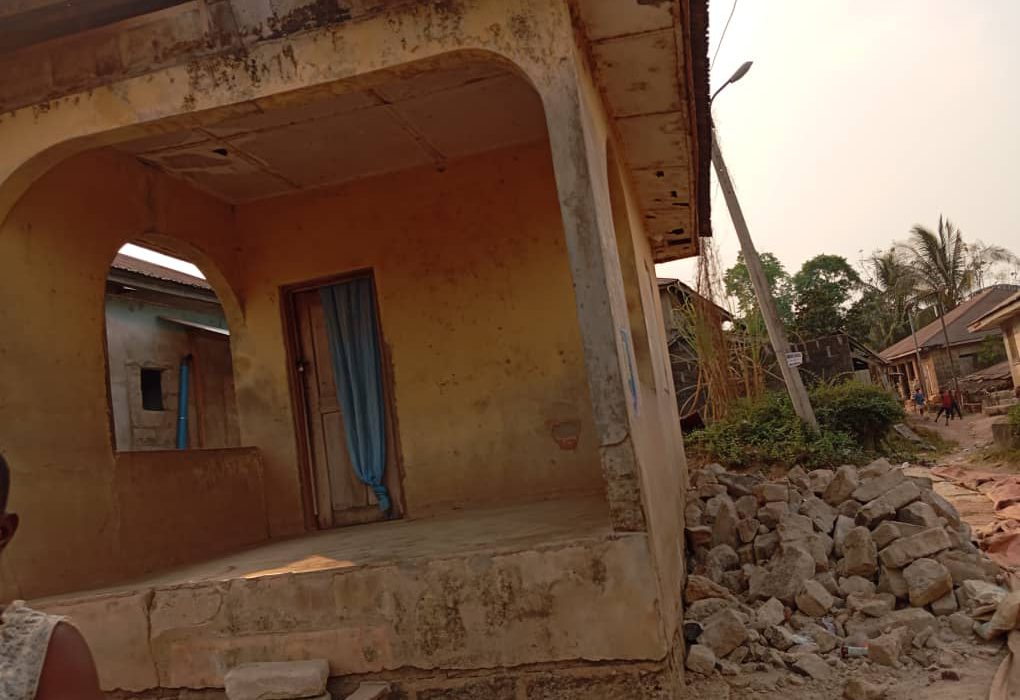In the remote, rugged hills of Etung Local Government Area in Cross River State, a silent but deadly crisis threatens the foundation of basic healthcare. Beneath the surface of dedicated health workers and hopeful patients lies a harsh reality: the lack of clean water at Nsofang Primary Health Center and Akarim Health Post has turned essential medical care into a dangerous gamble. Day after day, healthcare staff are forced to make impossible choices, risking hygiene and patient safety just to keep the doors open. The toll is mounting, and the risks are grave. In this investigation, SYLVIA AKPAN exposes the stark truth behind a preventable emergency, one that has festered in plain sight and reveals the profound human cost of neglect and systemic failure.
Meet Glory, a dedicated health worker at the rural clinic in Nsofang Primary Health Center, whose eyes clouded with tears as she recounted the fateful day she unintentionally harmed a patient due to the clinic’s water situation.
“I was trying to save a young girl from malaria, but I ended up giving her typhoid instead,” she said, trembling with regret.
The girl, a bright-eyed six-year-old named Nneoma, had been brought to the clinic with a high fever and severe headaches. Nurse Glory had diagnosed her with malaria and prescribed the necessary medication. However, due to the clinic’s lack of access to clean water, she had used water from the nearby polluted stream to mix the medication.
“I didn’t know the water was contaminated,” Nurse Glory explained with her eyes welling up with tears. “But I should have been more careful. I should have known better.”
As the days went by, Nneoma’s condition worsened. She began to experience severe stomach pains, diarrhea, and vomiting. Nurse Glory was devastated when she realized that she had inadvertently given Nneoma typhoid fever, likely due to the contaminated water.
“I felt like I had failed her,” she said with a cracking voice full of emotion. “I had taken an oath not to harm, and yet, I had caused her more suffering. It was a hard pill to swallow.”
The incident weighed heavily on Glory’s conscience, and she couldn’t help but wonder how many other patients might have fallen victim to the clinic’s water woes. She knew that she was not alone in her struggles, as many healthcare workers in rural areas faced similar challenges.
READ: When Caregivers Become Victims: Unsafe Sanitation In Cross River’s Primary Health Centers
“Every day, we risk our lives to fetch water from that stream,” Nurse Glory said with a tone filled with frustration. She added: “It is a dangerous journey, and it is not just the water that is the problem. It is the lack of resources, the lack of support. We are expected to provide quality care with limited means, and it is just not possible.”
“We are not just healthcare workers, we are human beings. We deserve better, and so do our patients.”

As the reporter sat in the worn-out waiting room of the local health clinic, surrounded by the faint scent of disinfectant and the soft hum of murmured conversations. The creaky wooden benches seemed to sag under the weight of expectant mothers, each one clutching a worn-out folder filled with medical records and hopes for a healthy delivery. Waiting for an interview with one of the patients, this reporter could not help but notice the makeshift setup of the clinic. The antenatal care area was little more than a corner of the waiting room, partitioned off by a flimsy curtain.
That is when she met Mrs. Mary John, an expectant mother who had been waiting patiently for her turn. As conversation ensued, the patient’s passion and conviction were palpable.
“The service here is good, but I know it can be great. That is why I am calling for an antenatal room to be built, a space where pregnant women like me can come for maternity check-ups and feel truly cared for.”
With a warm smile, Mrs. John wished that: “Imagine a cozy room filled with plush chairs, soothing colors, and the gentle chatter of expectant mothers sharing their joys and concerns. A place where women can feel supported, informed, and empowered to take care of themselves and their babies.”
She said that an antenatal room would be a game-changer for the community and would show they value the health and well-being of mothers-to-be, as well as being committed to providing them with the best possible care.
One of the healthcare workers, Stella Mbe Egom, said water scarcity is a major concern. This, she said, they trek kilometers to fetch water from a river.
“We have to descend the hill and go to the river to fetch our water anytime we have a case, even at night. That is what we suffer here.”
As she spoke, she gestured to the small bucket in the corner of the room, partially filled with water. “You see this small bucket, this is where we store water in case of emergency, because I don’t have the strength to go down the hill and come back,” she said, as if the memory of the countless trips made to the river was too much to bear.

Paying attention as the nurse shares her challenges in a small and cluttered office, with medical supplies stacked haphazardly on shelves. A small desk in the center of the room was cluttered with papers and files, and a single chair just opposite the desk, where the reporter was seated.
The nurse continued: During the rainy season, we don’t usually lack water because we have rainwater. But during this dry season, we suffer a lot,” as she shook her head. “To descend that hill and come up is not easy for some of us, so we lack water.”
ALSO: How Bad Roads To Cross River Primary Healthcare Leads To Miscarriages, Death
As she spoke, the reporter couldn’t help but think of the grave consequences of using unsafe water. Diarrhea and cholera outbreaks were common in areas of water scarcity or unclean water.

The nurse shared that they have had cases of diarrhea and cholera in the past, and “it is always a struggle to contain the outbreak.”
Emmanuel Edom, a 34-year-old, stood in his backyard, gazing out at Nsofang Primary Health Center just a stone’s throw away. He couldn’t help but wonder how the staff managed to care for patients with such limited resources.
“The clinic’s water crisis was no secret; every day, staff members would trudge down the steep, dusty hill that wound its way behind the clinic, juggling plastic jerry cans and dignity as they made their way to a nearby stream.”
The makeshift solution seemed like a Band-Aid on a bullet wound, a temporary fix that only reflected the deeper problems plaguing the healthcare system, Emmanuel observed, as he kept a fixed gaze at the staff’s struggle to cope with imagery of countless mothers and babies whose lives hung in the balance.
“How could a healthcare system so vital to the community’s well-being be plagued by such a basic yet critical shortage?” What would it take to fix this broken system, and give the people of Cross River State the healthcare they deserve?” he questioned.
RELATED: Welcome To Cross River Community Where Child Deliveries Are Done In Pathetic Collapsed Health Center
Dedicated community health workers, driven by passion to serve and commitment to treat, are compelled to make impossible choices every day. With the government’s abandonment, they have taken on the burden of keeping their facilities afloat.
At Nsofang PHC, the pharmacy shelves lie bare, reflecting the medicines they can not afford and the treatments they can not administer. Patients come seeking good health and lives, only to be turned away and their hopes dashed.
Findings revealed that restrooms and floors are broken, the power flickers out, plunging the facilities into darkness, and the staff struggle to cope with the weight of their responsibilities.
Despite the challenges the health workers face, they continue to show up to administer treatment and care for patients.

After an extensive search, CrossRiverWatch found the Akarim Health Post. The facility was hidden in a hard-to-find area. It is identified by its worn-out scattering small building.
At Akarim Health Post, a nurse, Justina Nkiri Ogbu, told CrossRiverWatch that she has lost count of the number of patients she has rejected due to lack of resources – the facility is in shambles. No beds, no medical equipment, no drugs.
Ogbu’s salary is barely enough to cover her living expenses, let alone buy the medications her patients desperately need. The facility’s infrastructure is crumbling, with no toilets, no electricity, and no access to clean water. Patients travel miles to reach the clinic only for their hopes to be dashed due to lack of basic health provisions.
“I’m begging the government to please help us. “We need a functional health facility. We need the necessities to provide care for our patients. Is that too much to ask?”
She gestured to a rubber container beside her filled with unhealthy water from a nearby stream. “This is what we use to store water. “It’s not always clean, but it’s what we have to work with.”
Akarim Health Post is a small, makeshift single-room facility that serves as both a waiting area and a multipurpose space, lacking essential amenities such as a pharmacy, delivery bed, toilets, and other critical medical facilities.
According to the World Health Organisation (WHO), in 2022, at least 1.7 billion people globally used drinking water sources contaminated with feces. Safe water access is critical not just for survival but for reducing poverty and boosting national development.

Medical Expert And CSO Lends Voice, As Government Shifts Responsibility
According to medical expert Victor Kendrick, Water, Sanitation, and Hygiene (WASH) practice plays a vital role in maintaining individual and community health. He said having access to safe drinking water, proper sanitation facilities, and adopting consistent hygiene habits are fundamental necessities that can significantly impact public health.
“The importance of WASH practices cannot be overstated. Safe drinking water is essential for human consumption, and its absence can lead to a myriad of health problems. Proper sanitation facilities are equally crucial, as they prevent the spread of diseases and maintain a clean environment. Consistent hygiene habits, such as regular handwashing, are also vital in preventing the transmission of illnesses.
YOU MAY ALSO READ: How Abandoned Health Centers Endanger Lives Of Citizens In Cross River
A civil society development practitioner, Ukeme Ekong, has expressed concerns about the lack of or poor pipe-borne water in health centers in most PHCs across the state. Ukeme said it is sad that the challenge of no water in health facilities can still be witnessed.
“It’s sad that in the 21st century, like this, we are still talking about the issue of lack of pipe-borne water, poor access to water. Water is the right of a health facility,” Ekong emphasized.
When contacted, the Commissioner for Health in Cross River State, Dr. Egbe Ayuk, redirected inquiries to the Director-General of the State Primary Health Care Development Agency, Mrs. Vivienne Mesembe Otu, who, in turn, passed on the responsibility back to the Commissioner, leaving the crisis unaddressed.
This story was produced for the Frontline Investigative Program and supported by the Africa Data Hub and Orodata Science.
Since You Are Here, Support Good JournalismCrossRiverWatch was founded on the ideals of deploying tech tools to report in an ethical manner, news, views and analysis with a narrative that ensures transparency in governance, a good society and an accountable democracy. Everyone appreciates good journalism but it costs a lot of money. Nonetheless, it cannot be sacrificed on the altar of news commercialization. Consider making a modest contribution to support CrossRiverWatch's journalism of credibility and integrity in order to ensure that all have continuous free access to our noble endeavor. CLICK HERE |
New Feature: Don't miss any of our news again.Get all our articles in your facebook chat box.Click the Facebook Messenger Icon below to subscribe now
Text Advert by CRWatch :Place Yours

Will You To Learn How To Make Millions Of Naira Making Special Creams From Your Kitchen?.Click Here
Expose Your Business And Make More Sales. Advertise On CrossRiverWatch.com Today



Leave feedback about this